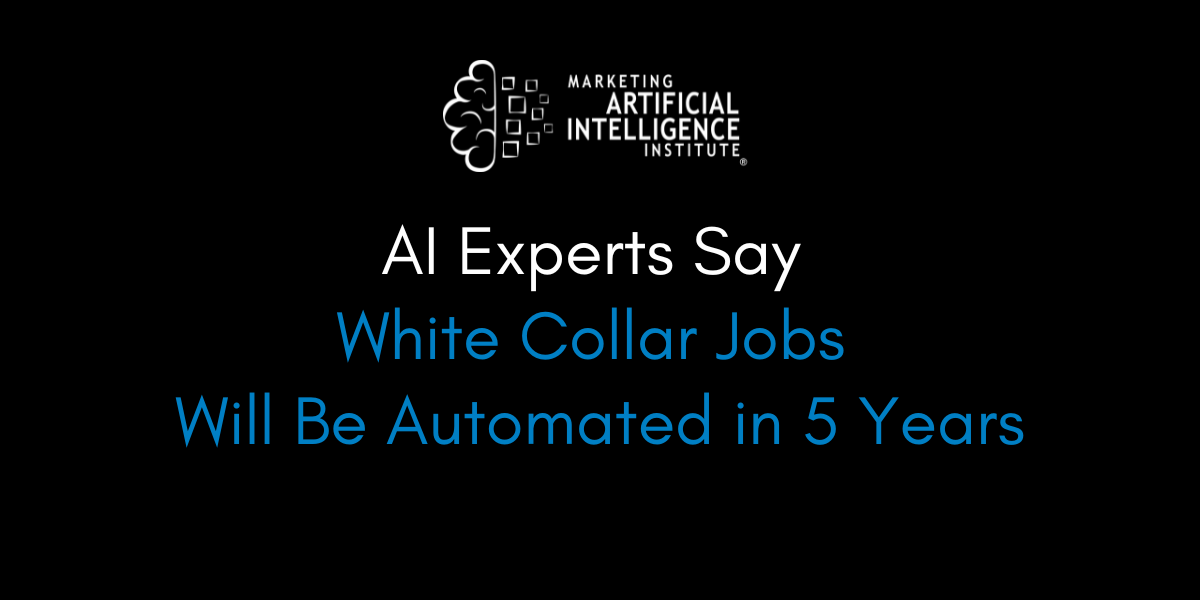If you think job automation from AI is still a decade away, you’re missing what’s happening right now.
In Episode 149 of The Artificial Intelligence Show, Marketing AI Institute founder and CEO Paul Roetzer unpacked a revelation that hits harder than most headlines:
The AI models we have today are potentially already capable of replacing large swaths of white-collar work.
Not hypothetically. In just a few years, according to a conversation between AI experts on The Dwarkesh Podcast.
"Even if AI progress totally stalls, it's sufficiently easy to collect data on all these different white collar job tasks that we should expect to see them automated within the next 5 years." pic.twitter.com/DNtxIwd46R
— Dwarkesh Patel (@dwarkesh_sp) May 22, 2025
The Data Doesn’t Lie: AI Can Already Do the Work
Roetzer got this insight after listening to a recent episode of The Dwarkesh Podcast featuring two Anthropic researchers—Sholto Douglas and Trenton Bricken. Their conclusion?
Even if AI progress completely stalls, we’re likely to see a major drop-in replacement of white-collar workers within five years. The models are already that good.
They argue that the current AI models—when paired with job-specific data—are already economically viable replacements. The math is simple: Total addressable market (TAM) for salaries in fields like accounting, marketing, or law is huge. If a model can replicate even average performance, there’s a multi-billion-dollar incentive to build the product that does.
"They're basically AGI already," says Roetzer, especially when reinforcement learning is provided on top of models to customize them to different fields of white collar work.
Roetzer put the theory to the test.
He used Google’s Gemini Deep Research to conduct a market study: Which professions are most vulnerable based on TAM and automatable tasks? The result: a 40-page, AI-generated research report with 90 citations and a ranking of the top 30 professions by salary exposure.
The report itself helped him unpack the issue further. But the fact AI could even create the report in the first place proved the point that Douglas and Bricken were making: This was complex knowledge work that would have taken a skilled professional dozens of hours to do in the past, says Roetzer.
"I took the kids to school, and I came back 20 minutes later, it was done."
In just a few more minutes of experimentation, Roetzer also used Gemini Deep Research to create:
- A 17-minute audio summary of the report
- A 10-question quiz based on it
- A full webpage
- An infographic
- A clickable app
All in minutes. With no technical skills needed.
The Tools Are Here. Most People Just Aren’t Using Them
What's notable isn't just the current, stunning capabilities of today's models. It's how few people still fully understand or take advantage of these capabilities.
Roetzer notes that, in his talks, only maybe 5% of people have even used Google Deep Research. But once even 20–50% start doing so?
"The future of work will have changed," he says.
That's from a single capability in a single model, which just proves the point: These tools are sitting in plain sight, radically powerful and barely explored.
Roetzer’s key takeaway:
This is the dawn of a radically different professional world. Leaders who aren’t integrating these tools into their workflows will soon be outpaced by AI-forward employees.
Mike Kaput
Mike Kaput is the Chief Content Officer at SmarterX and a leading voice on the application of AI in business. He is the co-author of Marketing Artificial Intelligence and co-host of The Artificial Intelligence Show podcast.


